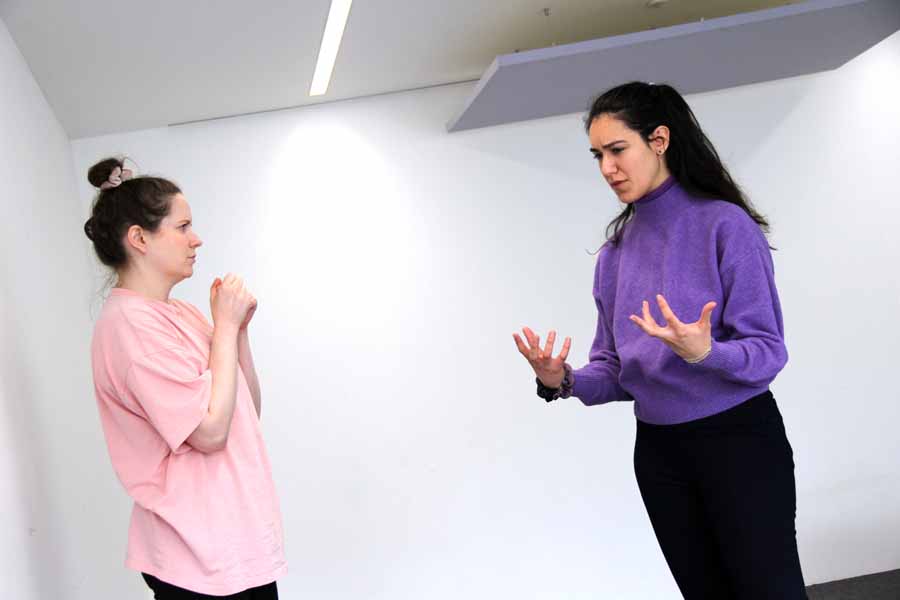Writer, dramaturg, and conversation facilitator Maddy Costa shares more about Theatre Club – a casual conversation space for audience to talk about a show they have seen.

OMNIBUS THEATRE: Tell us more about what Theatre Club is.
MADDY: It’s very basic: it’s a conversation space, for audiences to talk about a show they’ve seen – but without the people who made the show in the room. It’s different in that way to, for instance, post-show Q&As, or panel discussions: we’re not looking to artists or experts to explain anything, instead bringing our own experiences and knowledges to share with each other, along with our responses to what we’ve seen on stage. For instance, at a recent Omnibus Theatre Club, talking about Live to Tell, we talked about the structure of the show, and the performances – but we also shared our (lack of) understanding about side effects of medication, and someone shared information about LSD trials at a London University, as medication for severe mental health problems. You can learn a lot at a Theatre Club, just through chatting with people.
OMNIBUS THEATRE: Who is Theatre Club for and when does it take place?
MADDY: Anyone who has seen the show can come! At the Omnibus it takes place immediately after a show, but you don’t have to have seen the show that night to join the conversation. In fact, it can be great if people who see the show on different nights come back for the Theatre Club: they’ve had more time to consider their responses – and can tell you if anything was different the night they saw it! The exciting thing about Theatre Club is getting to see a show through many people’s eyes: even if you all saw a show on the same night, you’ll have seen different things in it.
OMNIBUS THEATRE: What inspired you to create Theatre Club and how has it evolved since it first started?
MADDY: Theatre Club was actually created by a brilliant community theatre artist called Lily Einhorn, when she was working at the Young Vic Theatre in its participation team. She wanted to create a space for people who were receiving free tickets as part of a participation scheme to have somewhere to talk about the work that felt like a safe and brave space. She asked me to facilitate, and that first conversation was so fascinating, full of contradictory opinions, that I knew I wanted to host Theatre Clubs for plays outside the Young Vic too. That was in 2012 and it hasn’t evolved much since then, because the premise of it is so simple: let’s talk about this show, and see what we learn from each other.
OMNIBUS THEATRE: Can you walk us through what a typical Theatre Club event is like? What is the atmosphere like?
MADDY: It’s an informal event so the atmosphere is relaxed: there are drinks and snacks, and it’s a bit like sitting around a pub table, but with the focus of talking about a particular show. We never start by introducing ourselves, as I feel that might affect the conversation: will someone worry about sounding stupid if there’s a theatre director in the room, for instance? There’s so much anxiety around ‘understanding’ theatre, and it’s important to me that Theatre Club steers away from that: if you don’t understand something, come and talk about it! Chances are, the rest of us didn’t understand either! But we’ll all have felt something watching the show, and different things will have resonated with each of us in different ways: by sharing that, and asking questions about things we felt unclear about, we often open out understandings – and reach understandings we might not have accessed on our own.
OMNIBUS THEATRE: Why is it important to have such a conversation space for theatre-goers?
MADDY: Theatre often provokes really strong feelings in people: it’s a way of experiencing difficult things, without having to experience them directly. So it’s astonishing to me that more theatres don’t provide this kind of space for audiences to reflect together, and decompress, before they take those feelings back home with them. I also think of theatre as a place in which we can consider both how people live, with each other, within the environments we’ve created, and with the environment that resists our control; and how people might live – a kind of rehearsal for the society that doesn’t exist yet but could. In the society we’re in now, public dialogue feels polarised and fraught, and there’s not a lot of space for dialogue across difference. But at Theatre Club, people with very different backgrounds, political beliefs, experiences, can gather to discuss sometimes quite difficult issues, without falling into social divides. I gain so much from that and hope others do too.
OMNIBUS THEATRE: What do you think makes Theatre Club different from other post-show discussions?
MADDY: The artists not being in the room! It gives people freedom to think more widely about how the work was made and why it was made that way, to look at their emotional responses, and explore anything they felt they didn’t understand.
OMNIBUS THEATRE: What advice would you give to someone who has never attended Theatre Club before?
MADDY: Just try it! You might already have lots of people to talk with about theatre you see, but I would still recommend Theatre Club, to encounter the breadth of responses a single show can elicit. Or, you might not have anyone to talk with about theatre, in which case, here are lots of people you can process your experience with, especially if there’s anything about the show that you’ve found emotionally fraught. If you feel shy of sharing your thoughts and opinions with a group of strangers, that’s fine too: we often have people who attend Theatre Club and mostly listen – although I’m always hopeful those people will find the confidence to speak up, as every thought is interesting and good to hear.
OMNIBUS THEATRE: What have previous participants shared about their experience in Theatre Club?
MADDY: My favourite thing that happens at Theatre Club – and it’s happened a lot – is when someone comes who really disliked the show, who says at the end of our conversation: ‘I got so much out of hearing what you all thought, and I’d like to see the show again now – to experience it with your reflections in mind’.
OMNIBUS THEATRE: What are you most excited about doing next in Theatre Club?
MADDY: Theatre Club has changed so little in the 10 years I’ve been hosting it: each one is the same, but what excites me about it is that each one is also completely different! The show is different, the people attending are different, how we feel will be affected by the news that day, or that month – all of these things change what happens within Theatre Club. Each conversation is new, and an encounter with thoughts and ideas that expand my understandings of the theatre I’ve seen and the society I’m living in. That’s what keeps me excited.
Maddy Costa works in and around theatre as a writer, dramaturg, conversation facilitator and more. She is co-author of Performance in an Age of Precarity (Methuen, 2021), and has a particular interest in writing about community arts. As a dramaturg she has worked with artists including Paula Varjack, Selina Thompson and Rosie Elnile; she also collaborates with writers/artists Mary Paterson and Diana Damian Martin on interrelated projects Something Other and The Department of Feminist Conversations. She co-hosts a pop-up theatre club – like a book group, but for performance – at Cambridge Junction, Omnibus Theatre in London, and online.



